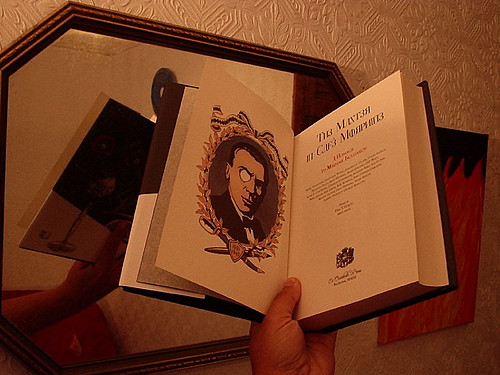Thursday, July 21, 2011
A tribute to Михаи́л Булга́ков
 Russia has produced more amazing writers than any other country in the world. Russia oozes talented authors in the same way that a man who is being chased by a bear oozes sweat and fear. It is unnecessary to mention the names of Tolstoy, Gogol, Pushkin, Lermontov, Dostoyevsky, Turgenev, Chekhov, Sologub, Akhmatova, etc. The Russian writer who has had the greatest personal impact on me is Vladimir Nabokov (to those who have only read Lolita I recommend some of his early works such as Glory and Despair). I am also a devotee of Yevgeny Zamyatin, Daniil Kharms and the Strugatsky Brothers. And even now I am discovering names of prodigous Russian talents previously unknown to me: Sigizmund Krzhizhanovsky and Victor Pelevin, for example.
Russia has produced more amazing writers than any other country in the world. Russia oozes talented authors in the same way that a man who is being chased by a bear oozes sweat and fear. It is unnecessary to mention the names of Tolstoy, Gogol, Pushkin, Lermontov, Dostoyevsky, Turgenev, Chekhov, Sologub, Akhmatova, etc. The Russian writer who has had the greatest personal impact on me is Vladimir Nabokov (to those who have only read Lolita I recommend some of his early works such as Glory and Despair). I am also a devotee of Yevgeny Zamyatin, Daniil Kharms and the Strugatsky Brothers. And even now I am discovering names of prodigous Russian talents previously unknown to me: Sigizmund Krzhizhanovsky and Victor Pelevin, for example.Why continue to drop names in this manner? The point is that one of the greatest of all Russian writers (perhaps the greatest of the 20th Century) was Mikhail Bulgakov; and Ex Occidente, the Romanian publishing house, has brought out a tribute anthology to that marvellous genius. I won't recommend specific works by Bulgakov here: they are all good. He was an expert at compressing a huge amount of action, thought and atmosphere into every page he wrote. One of his trademark techniques was to show scenes at slightly oblique angles, so that you don't quite "get" them immediately; there's always a delay before things click, but it's a very small delay, just like in real life. That's why he's ultimately a realist even though he writes (sometimes wild) satiric philosophical fantasy.
The Master in Café Morphine is a limited-edition deluxe volume featuring contributions from a score of writers. My own copy arrived yesterday and I haven't had a chance to read any of it yet apart from the Mark Valentine story (Valentine is always good). But I'm delighted to announce that this anthology contains one of my own stories, a 12,000 word novelette entitled 'The Darkest White' that seeks not only to engage with an imaginary Bulgakov but also with another writer from that era: the mysterious Lev Nussimbaum. It's an adventure story, both mystical and visceral, and is the most directly politcal tale I have ever attempted.
Subscribe to Comments [Atom]
